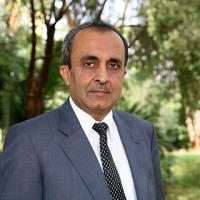UNEP Opening Keynote

Jamil Ahmad, Director of the United Nations Environment Programme (UNEP) New York Office
introduced by Eileen Venezia – CTAUN Director–at-Large.
UNEP is responsible for ecosystem management & environmental governance, and ensuring that the Paris Agreement is fulfilled worldwide. 95% of UNEP’s funding comes from donations.
Mr. Ahmad began by saying that, compared with 40 years ago, “there is hardly a discussion today that doesn’t involve climate change. It poses an existential crisis, and the problem is man made. More than 7 billion people are using the earth’s resources. If we continue consuming at our current rate, we would need a new planet, and the window of opportunity to fix it is shrinking. ” He followed this with alarming statistics from the GEO6 report released last month:
2 billion people in the world don’t have access to clean water or sanitation, and water resources are depleting – droughts have tripled over the last 50 years.
3 1/2 million will die of water-related diseases, and 7 billion deaths yearly derive from poor air quality.
30 million tons of plastic are dumped in the ocean annually, and deforestation also degrades the environment.
As ice melts, some islands are submerged; 80% of people live in danger of rising water levels.
730 million people live in poverty – not only in the developing world, but within wealthier countries as well.
The Secretary-General has said that doing more of the same will not get the job done. He has called for a universal framework for sustainable development, and a high level political forum to evaluate progress and practices involving the Sustainable Development Goals (SDGs). 90 countries have agreed to revamp their policies, and the UN plays a major role in the $5 trillion annually given to green investment. Poorer countries, where climate change has the greatest impact, depend on that support. But only systemic change will help –the goal of the 2030 agenda is to leave no one behind.
Our youth – 1.8 billion aged 10-24, the largest new generation ever, also have the right to a role in decision- making. He spoke about Greta Thunberg, the dynamic Swedish adolescent whose passion for immediate action is galvanizing – (“I don’t want you to be hopeful – I want you to panic!” she insists.) He envisions teachers as protectors of the planet, and a major positive influence on students for a responsible lifestyle. “Let’s start with ourselves,” he said. “Reduce, reuse, recycle and return to normalcy.”
Anne-Marie Carlson then added: “This is not someone else’s responsibility –it’s ours.”
